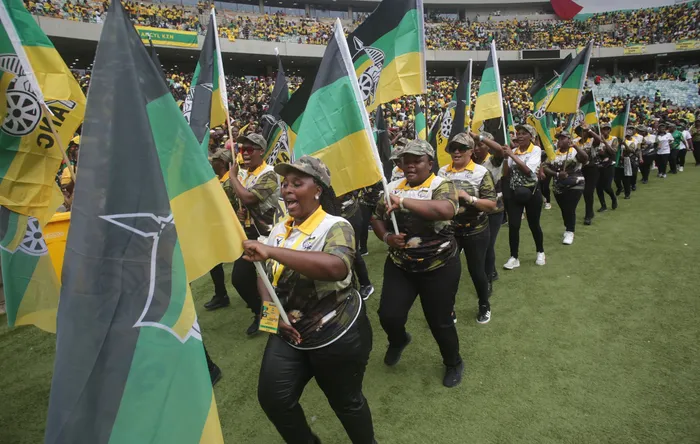Gauteng, KZN battlegrounds litmus test for future ANC rule

Picture: Khaya Ngwenya / Independent Newspapers / February 24, 2024 – Young ANC supporters parade before the launch of the ANC’s election manifesto at Durban’s Moses Mabhida Stadium yesterday. The writer explains why Gauteng and KwaZulu-Natal are two provinces that will determine the outcome of this year’s election.
By Bheki Mngomezulu
On Tuesday President Cyril Ramaphosa announced May 29 as the date of this year’s general election. This followed consultation with the Electoral Commission of South Africa (IEC) and the premiers of all the nine provinces about their state of readiness to conduct this election. Such an announcement put to rest any speculation about the different dates that various people had suggested as the election day.
While it is true that all nine provinces have a role to play in swaying the result of the election to any political party, population density of each province and the economic stature of these provinces are some of the main factors which make certain provinces stand out in comparison to others.
General observation shows that Gauteng and KwaZulu-Natal are two provinces that will determine the outcome of this year’s election. There are various reasons for that.
The first reason is the population density. The latest statistics show that when looking at five of the nine provinces, Gauteng has the biggest voting population at 6,497,792 or 23.53 percent.
KZN comes second at 5,726,609 or 20.74 percent. The Eastern Cape comes in the third at 3,432,638 or 12.43 percent. The fourth spot is taken by Limpopo at 2,771,809 or 10.04 percent, with Mpumalanga taking position five at 2,019,664 or 7.31 percent.
The second reason has to do with the economic activities of the two top provinces. Gauteng is the highest-performing province in terms of its contribution to the Growth Domestic Product (GDP).
Once again, KZN comes second. Gauteng has underground minerals, while KZN boasts of two busy harbours, Durban and Richards Bay.
Thirdly, the two provinces are the battlegrounds for both the ANC and the IFP. Historically, Gauteng has been one province which attracted many people from KZN who came to work in the mines or to stay.
With the IFP drawing its support mainly, but not solely, from the Zulu people, Gauteng and KZN have been provinces of interest to both the IFP and the ANC.
Linked to the above factor is the emergence of the uMkhonto weSizwe Party (MK). On December 16, former president Jacob Zuma announced that he was going to canvass for the MK Party, not the ANC. This poses a threat to many political parties – including the ANC.
The decision by the ANC, EFF and the IFP to launch their party manifestos in KZN at the Moses Mabhida Stadium should be understood within this political context. Julius Malema, the leader of the EFF, stated that in his analysis Gauteng had already slipped away from the ANC. Therefore, the next province that the ANC would like to retain is KZN.
He believes that derailing the ANC’s plans to retain KZN would further weaken the ANC and increase the chances of the EFF or any other party, such as the IFP, to topple the ANC from power in that province.
Regarding KZN, another reason is that this has been the ANC’s biggest province nationally in terms of support. This means that anyone who wants to do well in the forthcoming election would have to gain more support in KZN and Gauteng.
Moreover, eThekwini is the ANC’s biggest region in the country. This explains why all three political parties deemed it necessary to launch their election manifestos in this metro.
Members of the Multiparty Charter for South Africa (previously known as the Moonshot Pact) have been frequenting KZN while also crisrossing Gauteng. They have been doing this to ensure that they amass enough support in these provinces in preparation for a post-election coalition.
Coalition governments at both national and provincial levels remain a possibility. This view is given substance by the fact that both the ANC as the governing party and the DA as the official opposition have been on the decline. Meanwhile, parties like the EFF, IFP, and Freedom Front Plus (FF+) have been on an upward trajectory.
However, none of these parties has grown enough to single-handedly replace the ANC. Moreover, the ANC has not declined to the extent that it is no longer a force to be reckoned with. This means that the possibility of a grand coalition or a minority coalition is indeed a possibility.
All political parties should start preparing for such coalitions. Gauteng and KZN should be provinces of interest – not just to the ANC and the DA or its coalition partners, but to all other political parties and independent candidates.
These factors do not in any way nullify the Western Cape’s significance to the DA. The party will still do all in its power to retain the Western Cape.
However, it is known that even the DA has shown interest in Gauteng and KZN. The intermittent motions of no confidence by the DA in eThekwini mayor Mxolisi Kaunda and the call to disband the municipality attest to this assertion.
Based on these reasons, it is irrefutable that both Gauteng and KZN will be two critical provinces that will determine the outcome of this year’s election. Any political party that does not invest in getting support from these two provinces would be doing so at its own peril.
The other seven provinces remain important in their own right since every vote counts. Gauteng and KZN will undoubtedly lead the pack in deciding who emerges victorious in this year’s election.
Prof Bheki Mngomezulu is Director of the Centre for the Advancement of Non-Racialism and Democracy (CANRAD) at the Nelson Mandela University